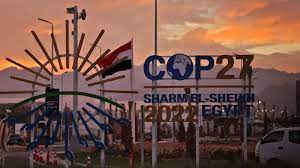18 Nov , 2022 By : Kaushiki Mehta

Global climate talks approached crunch time on Friday, the final scheduled day of negotiations that are expected to go past their deadline as chances of a deal still looked unclear.
A new draft cover decision from the Egyptian presidency came out Friday morning, half the size of a 20-page document released Thursday that was criticized for being vague and bloated.
The document contained few new proposed solutions for curbing oil and gas emissions and repairing damage caused by climate change.
The EU made a surprise proposal late Thursday that could help buoy chances of an agreement. The proposal would tie compensation for climate disasters to tougher emissions cuts, two of the thorniest issues at the meeting.
EU climate chief Frans Timmermans said Friday that the bloc’s proposal on funding for loss and damage and mitigation is “a final offer” that seeks to “find a compromise” between countries as negotiators work out a way forward at the United Nations climate talks in Egypt.
In climate negotiations, loss and damage refers to the idea that rich nations, which have historically done the most to contribute to climate change, should compensate developing countries most impacted. Mitigation refers to efforts to slow global warming, like drastically reducing emissions of greenhouse gases.
Timmermans said he was “encouraged” by immediate reaction to the proposal and more engagement was expected on Friday.
“This is about not having a failure here,” said Timmermans. “We cannot afford to have a failure. Now, if our steps forward are not reciprocated, then obviously there will be a failure. But I hope we can avoid that.”
The proposal from the 27-nation EU offers a two-pronged approach that would create a pot of money for poor countries and push for steeper cuts of heat-trapping emissions by all countries, as well as the phasing down of all fossil fuels, including natural gas and oil.
The reception wasn’t quite as glowing as Timmermans’ portrays. Antigua and Barbuda’s environment minister says they have concerns about the EU proposal, while the environmental advocacy group Action Aid called it a “wolf in sheep’s clothing” because it doesn’t go far enough.
Molwyn Joseph, who spoke on behalf of small island sates, said there are parts of the EU’s proposal that need “adjusting,” without offering more details.
“We need an agreement at COP right now. That’s what we need, an agreement among all the parties,” he said, adding there is a “strong possibility” to achieve an agreement on loss and damage funding by Saturday.
Other big players were staking out their positions after the EU’s offer.
China, which had been quiet during much of the talks, and Saudi Arabia both said the money for a loss and damage fund shouldn’t come from them. Developed countries should foot the bill, China said. Both also insisted that the 2015 Paris Agreement that aims to limit global warming to an ambitious 1.5 Celsius (2.7 Fahrenheit) increase should not be altered.
As for the United States, there was “a deafening silence” after the EU revealed their proposal, said Preety Bhandari, senior adviser on climate finance at the World Resources Institute. “So I assume overnight and during the course of the day there will be a lot of diplomatic outreach across various parties to finally help us land the decision on funding for loss and damage here at COP27.”
The U.S. and China are the world’s top two sources of greenhouse gas emissions.
Friday’s draft from the Egyptian presidency includes some vague references to reform to multilateral development banks but did not include or make reference to the detailed Bridgetown Initiative on financial reform from Barbados Prime Minister Mia Mottley.
The initiative, which earned praise from figures such as French President Emmanuel Macron, called for development banks to issue $1 trillion in low-interest loans for climate spending in developing countries.
Also missing is a controversial proposal by India to change the Glasgow pact language that calls for a phase down of coal to a phase down of all fossil fuels, including oil and natural gas. The idea behind that is that a coal-only phase down hurts mostly developing nations and this attacks the problem of emissions more directly and across the board, according to longtime negotiations analyst Alden Meyer of the think tank E3G.
The idea of a fossil fuel-wide phase down is also in the European Union proposal.
0 Comment